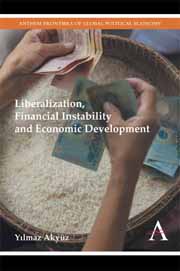Book contents
- Frontmatter
- Dedication
- Contents
- Introduction
- PART ONE LIBERALIZATION, STABILITY AND GROWTH
- Chapter I Financial Liberalization: The Key Issues
- Chapter II Managing Financial Instability in Emerging Markets: A Keynesian Perspective
- Chapter III From Liberalization to Investment and Jobs: Lost in Translation
- Chapter IV Exchange Rate Management, Growth and Stability: National and Regional Policy Options in Asia
- Chapter V Reforming the IMF: Back to the Drawing Board
- PART TWO THE GLOBAL ECONOMIC CRISIS AND DEVELOPING COUNTRIES
Chapter II - Managing Financial Instability in Emerging Markets: A Keynesian Perspective
from PART ONE - LIBERALIZATION, STABILITY AND GROWTH
- Frontmatter
- Dedication
- Contents
- Introduction
- PART ONE LIBERALIZATION, STABILITY AND GROWTH
- Chapter I Financial Liberalization: The Key Issues
- Chapter II Managing Financial Instability in Emerging Markets: A Keynesian Perspective
- Chapter III From Liberalization to Investment and Jobs: Lost in Translation
- Chapter IV Exchange Rate Management, Growth and Stability: National and Regional Policy Options in Asia
- Chapter V Reforming the IMF: Back to the Drawing Board
- PART TWO THE GLOBAL ECONOMIC CRISIS AND DEVELOPING COUNTRIES
Summary
Introduction
With widespread deregulation and rapid growth of financial wealth, business cycles in both advanced economies and emerging markets are increasingly dominated by the financial system.
It is true that there is not always a one-to-one correspondence between real and financial cycles, and recessions do not always go in tandem with financial crises. Nevertheless, the response of the financial system to impulses emanating from the real economy has become increasingly procyclical, and this tends to reinforce expansionary and contractionary forces and amplify swings in investment, output and employment, creating new dilemmas for macroeconomic policy.
With rapid liberalization of the capital account, international capital flows have become the driving force behind financial cycles in developing countries, capable of producing unsustainable expansions followed by financial crises and recessions. While country-specific (pull) and global (push) factors can both play important roles in determining their direction, size and nature, evidence shows that the most damaging episodes of financial crises in emerging markets are those associated with boom—bust cycles in capital flows driven by special and temporary global factors beyond the control of the recipient countries.
Indeed, since the early 1990s currency and balance of payments crises have occurred under varying macroeconomic and financial conditions in Latin America, East Asia and elsewhere. They were seen not only in countries with large and widening current account deficits (e.g., Mexico and Thailand), but also where deficits were relatively small and presumed sustainable (Indonesia and Russia).
- Type
- Chapter
- Information
- Publisher: Anthem PressPrint publication year: 2014



